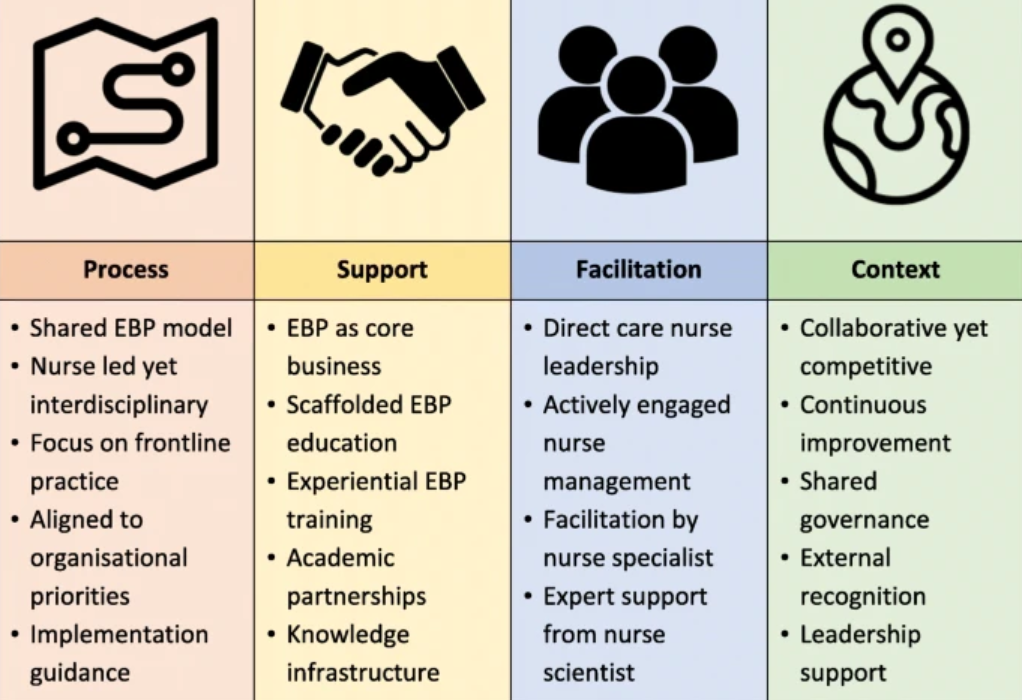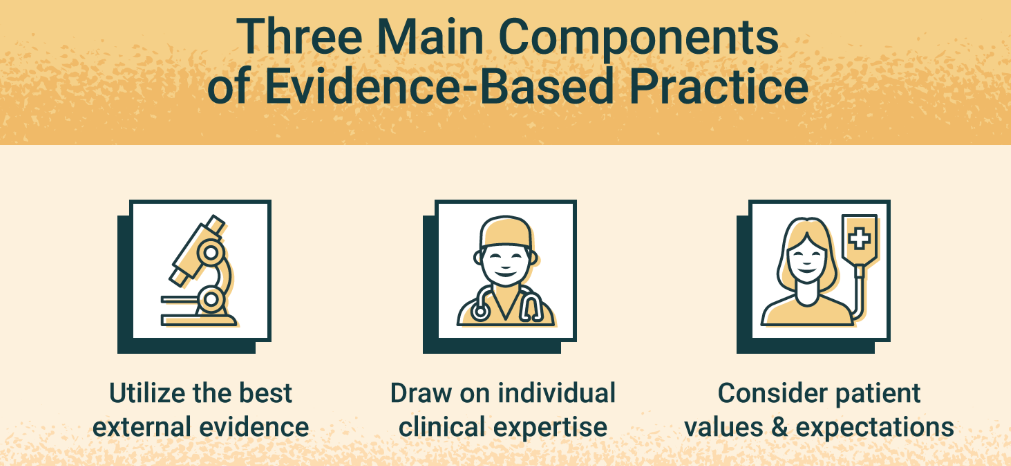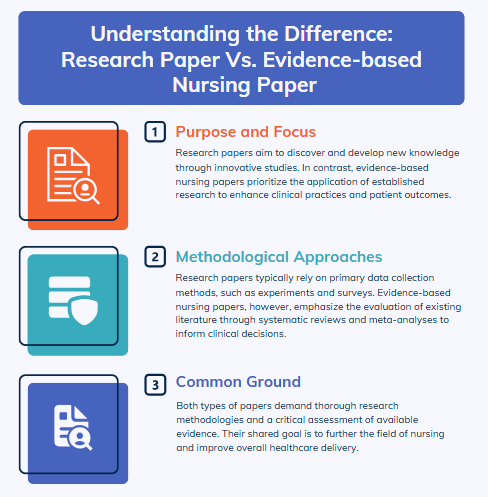
Table of Contents
In the ever-evolving landscape of healthcare, nurses are increasingly expected to make decisions grounded in the most up-to-date and reliable research. This demand has elevated the importance of the evidence-based nursing paper, a document that not only showcases a nurse’s understanding of a particular topic but also their ability to synthesize research findings and apply them to clinical practice. Creating a strong evidence-based nursing paper can seem daunting, but with a systematic approach, you can produce a compelling and valuable contribution to the field.
This article will guide you through the essential steps of writing a successful evidence-based nursing paper.
Understanding the Importance of Evidence-Based Practice in Nursing
Before diving into the mechanics of writing, it’s crucial to understand why these papers matter. At the core of nursing lies the pursuit of improved patient outcomes. Evidence-based practice in nursing (EBP) is the cornerstone of achieving this goal. It involves integrating the best available research evidence with clinical expertise and patient preferences to guide care decisions. Writing an evidence-based nursing paper allows nurses to explore and disseminate this evidence, contributing to the advancement of the profession and better patient care.
It’s not just about summarizing research; it’s about critically analyzing it and translating it into meaningful clinical applications. The principles of evidence-based practice underpin the entire process, ensuring that the care we deliver is grounded in sound scientific findings rather than outdated practices or personal preferences. Understanding that context is vital for crafting a powerful evidence-based nursing paper.

Key Steps in Writing an Evidence-Based Nursing Paper
The process of writing an evidence-based nursing paper can be broken down into several key stages.
1. Choosing Your Topic:
- Relevance: Select a topic that is relevant to your clinical practice, your area of interest, or a current challenge in nursing. This will make the research process more engaging and the final paper more impactful. A current issue or an area where you believe there’s potential for improvement often makes a compelling evidence-based nursing paper.
- Specificity: Avoid broad, sweeping topics. Instead, focus on a specific clinical problem, intervention, or population. A focused topic is much easier to research thoroughly.
- Feasibility: Ensure you have access to adequate resources and that the topic is manageable within the timeframe allotted.
2. Formulating a Focused Research Question:
- PICO Framework: Use the PICO (Patient/Population, Intervention, Comparison, Outcome) framework to craft a clear, answerable research question. For example:
- P (Population): Adult patients with post-operative pain following abdominal surgery.
- I (Intervention): Using guided imagery during recovery.
- C (Comparison): Compared to standard pain medication protocols.
- O (Outcome): Reduction in reported pain scores.
- Clear Question: A well-defined research question is the foundation of any good evidence-based nursing paper. Avoid vague inquiries and strive for a precise and testable question.
3. Comprehensive Literature Search:
- Databases: Utilize reputable databases such as CINAHL, PubMed, Medline, and Cochrane Library. Become adept at using keywords and Boolean operators (AND, OR, NOT) to refine your searches and find the most relevant studies.
- Grey Literature: Consider including grey literature, such as dissertations, conference proceedings, and government reports.
- Critical Evaluation: Don’t just gather articles; critically assess their methodology, sample size, and potential biases. The quality of the evidence you include is essential for a robust evidence-based nursing paper.
4. Critical Appraisal of Evidence:
- Hierarchy of Evidence: Understand the hierarchy of evidence, which ranges from systematic reviews and meta-analyses (the strongest) to expert opinions and case studies (the weakest). A high-quality evidence-based nursing paper should primarily be based on robust research designs.
- Validity and Reliability: Evaluate the validity (does the study measure what it’s supposed to measure?) and reliability (are the results consistent?) of each study.
- Bias: Identify potential sources of bias within studies (e.g., selection bias, recall bias, observer bias).
- Synthesize Findings: Don’t just report on individual studies; look for patterns, agreements, and disagreements in the research.
5. Developing the Structure of Your Paper:
- Introduction: Start by introducing your topic, its relevance, and your research question. End the introduction with a clear thesis statement.
- Literature Review: This section should present a synthesized overview of your findings from the literature search, critically analyzing studies, and relating them to your research question. A good literature review is essential for any credible evidence-based nursing paper.
- Methodology (If Applicable): If your paper incorporates original data collection or analysis (though less common in some types of evidence-based papers), describe your methods clearly. However, this is not always a component of an evidence-based nursing paper that focuses purely on literature review and analysis.
- Results: Summarize the key findings from your literature review. Avoid presenting each article in isolation; highlight trends and patterns.
- Discussion: Interpret the findings in relation to your research question. Discuss the implications of the research for nursing practice. Highlight strengths and limitations of the evidence.
- Conclusion: Reiterate your main points, summarize your insights, and suggest recommendations for future research or clinical practice.
- References: Include a comprehensive and correctly formatted reference list, adhering to a consistent citation style (e.g., APA, MLA).
6. Writing and Revising:
- Clarity and Conciseness: Write in a clear, concise, and professional manner, avoiding jargon or overly technical language. Aim for precision in your writing for a polished evidence-based nursing paper.
- Flow and Coherence: Ensure that your ideas are well-organized and flow logically. Use transitions to connect your thoughts.
- Objectivity: Maintain an objective tone and avoid making unsupported claims. The value of an evidence-based nursing paper depends on its impartiality.
- Proofreading: Proofread your paper thoroughly for spelling, grammar, and punctuation errors. Consider asking a peer to review your work for clarity and accuracy.
Examples of Evidence-Based Nursing Paper Topics
The landscape of healthcare is constantly evolving, demanding that nurses practice based on the most current and robust research. This is where evidence-based nursing (EBN) comes into play, a cornerstone of modern nursing practice. Writing an evidence-based nursing paper requires a thorough examination of existing research, critically analyzing its findings and applying them to specific clinical scenarios. But where do you start? Choosing the right topic is crucial.
The following are examples of compelling topic areas for an evidence-based nursing paper, offering a glimpse into the depth and breadth of possibilities.
1. Pain Management: This is a classic area ripe for EBN exploration. Topics could include:
- The effectiveness of non-pharmacological interventions for post-operative pain: Comparing techniques like guided imagery, music therapy, and acupuncture to traditional analgesics.
- Optimizing pain assessment for patients with cognitive impairments: Investigating tools and techniques that can accurately capture pain levels in these vulnerable populations.
- The impact of multimodal analgesia on opioid consumption: Analyzing the benefits of combining various pain relief methods to reduce the reliance on opioids.
These areas allow for rigorous analysis of existing studies and offer practical insights into improving patient comfort and care.
2. Patient Safety: Patient safety is paramount, and research in this domain is constantly evolving. Potential topics include:
- The impact of bedside handover protocols on patient outcomes: Examining the effect of standardized handover communication on errors and adverse events.
- Strategies for preventing falls in hospital settings: Comparing different fall prevention interventions like bed alarms, medication review, and patient education.
- The effectiveness of implementing checklists in preventing surgical errors: Analyzing the role of checklists in improving patient safety during surgical procedures.
These topics highlight the critical role nurses play in ensuring patient well-being and reducing preventable harm.
3. Mental Health Nursing: As mental health awareness increases, so does the need for evidence-based interventions. Consider these areas:
- The efficacy of mindfulness-based interventions for managing anxiety and stress: Investigating the benefits of mindfulness techniques for both patients and healthcare professionals.
- Early detection and intervention for postpartum depression: Examining the impact of screening programs and accessible support systems on maternal mental health.
- The role of peer support in the recovery process for patients with substance use disorders: Analyzing the effectiveness of peer-led programs in promoting recovery and reducing relapse rates.
These topics require a sensitive and nuanced approach to analyzing complex psychological needs.
4. Chronic Disease Management: With the global increase in chronic diseases, EBN is essential for effective management. Topics might include:
- The effectiveness of patient education programs in improving self-management of diabetes: Analyzing the impact of tailored education on blood sugar control and patient adherence.
- Strategies for promoting medication adherence in patients with hypertension: Investigating various interventions like reminder systems and tailored education to improve patient compliance.
- The role of telehealth in managing chronic heart failure: Examining the feasibility and effectiveness of virtual care in monitoring and managing heart failure patients.
These topics highlight the importance of nurses in helping patients effectively manage their chronic conditions and improve their quality of life.
Key Considerations for a Strong Evidence-Based Nursing Paper
- Relevance to Nursing Practice: The purpose of an evidence-based nursing paper is to bridge the gap between research and practice. Therefore, explicitly discuss how your findings can be applied in a real-world clinical setting.
- Ethical Considerations: Acknowledge ethical issues related to the research you discuss, and the topic in general. Always maintain patient confidentiality and respect autonomy.
- Integration of EBP Principles: Demonstrating understanding of EBP principles throughout your paper is crucial. Show how your approach, from question formulation to conclusion, is rooted in evidence-based nursing practice.
- Addressing Gaps in Knowledge: Identify gaps in the existing research and suggest areas for future investigation. Your evidence-based nursing paper should contribute to the advancement of knowledge in nursing.
- Persuasiveness: While grounded in evidence, your paper should also aim to persuade the reader of the importance of your findings and their implications for practice.
The Ongoing Importance of Evidence-Based Nursing
Writing an evidence-based nursing paper is a valuable skill for nurses at all stages of their careers. It hones critical thinking, research skills, and the ability to translate research into practice. These skills are essential for the ongoing improvement of patient care and for nurses to advocate for their patients effectively. As research continues to advance, the importance of the evidence-based nursing paper will only continue to grow, making this process of continuous learning central to professional nursing practice. The ability to produce a strong evidence-based nursing paper is key to the future of quality nursing care. Through the development of well-researched evidence-based nursing paper, nurses can further enhance their role as key contributors to the healthcare sector.

Frequently Asked Questions About Evidence-Based Nursing Papers
In the ever-evolving landscape of healthcare, the importance of evidence-based practice (EBP) has become paramount. For nursing professionals, this translates to consistently applying the best available research to patient care. Consequently, the creation of an effective evidence-based nursing paper is a critical skill. Many students and practicing nurses alike have questions about the process, so we’ve compiled a list of frequently asked questions to guide you.
What Exactly is an Evidence-Based Nursing Paper?
At its core, an evidence-based nursing paper is a written work that systematically explores a clinical question, utilizing rigorous research findings to support its claims. It’s not merely an opinion piece or a summary of personal experiences. Instead, it seeks to address a practical problem encountered in nursing practice using the most reliable, relevant evidence. This paper often involves defining a clinical question, searching for relevant literature, critically appraising the evidence, and synthesizing these findings to provide recommendations for practice.
What Kind of Clinical Questions Are Suitable for an EBP Paper?
The best clinical questions for an evidence-based nursing paper are those that are specific, measurable, achievable, relevant, and time-bound (SMART). These questions often focus on a patient population (P), an intervention (I), a comparison (C), and an outcome (O), which is referred to as PICO. For instance, instead of asking “Is patient education important?” a more appropriate question might be “In adult patients hospitalized with heart failure (P), does structured discharge teaching (I) compared to routine discharge instructions (C) lead to lower readmission rates within 30 days (O)?” This structured approach guides your research and makes the paper more focused.
Where Should I Find the Evidence?
Finding reliable evidence is crucial. The most credible sources include peer-reviewed academic journals, such as the Journal of Nursing Scholarship or Nursing Research. Online databases like PubMed, CINAHL, Cochrane Library, and ProQuest Nursing are invaluable for locating relevant studies. Be sure to utilize keywords that accurately reflect your PICO question when searching. Avoid relying solely on websites without established credibility, as they may contain biased or inaccurate information.
How Do I Critically Appraise the Evidence?
Simply finding research is not enough; you must critically evaluate it. Critical appraisal involves examining the study methodology, sample size, biases, and validity of results. Look for clearly defined methodologies, representative samples, appropriate statistical analysis, and transparent reporting of limitations. Use appraisal tools like the CASP (Critical Appraisal Skills Programme) checklists to assist you. This step determines the strength and relevance of the evidence you use in your evidence-based nursing paper.
What is the Difference Between a Research Paper and an Evidence-Based Nursing Paper?
While both use research, they have distinct purposes. A traditional research paper usually involves conducting new research, collecting primary data, and analyzing it to contribute to the body of knowledge. An evidence-based nursing paper, however, usually analyzes existing research to address a clinical problem, often aiming for practical implications for nursing practice. They both rely on sound research principles, but their goals and methodologies differ.

What Should the Structure of My Evidence-Based Nursing Paper Look Like?
A typical EBP paper includes an introduction outlining the clinical problem and PICO question, followed by a literature review that synthesizes relevant studies. The appraisal of the evidence is then discussed, followed by a section where you synthesize the findings and come to conclusions. You should finish with a discussion of the implications for practice, recommendations, and limitations. Make sure your paper adheres to proper academic writing standards and referencing guidelines.
How Can I Ensure My Paper is Effective?
To write a successful evidence-based nursing paper, focus on clarity, conciseness, and a logical flow. Ensure that your arguments are well-supported by evidence. Your writing should be objective, avoiding personal biases. Remember to carefully cite your sources. Finally, seek feedback on your drafts from peers or mentors. By addressing these key points, you’ll be on your way to creating a comprehensive and impactful paper.
By understanding these frequent questions, both students and practicing nurses can confidently approach the task of creating a sound and useful evidence-based nursing paper. This, in turn, will contribute to better patient care and advance the practice of nursing.
Creating an effective evidence-based nursing paper requires a systematic approach, critical thinking, and a dedication to using the best available evidence to inform clinical practice. By following these guidelines, you can produce a paper that is both informative and impactful.
Writing an evidence-based nursing paper is a challenging but rewarding process. It requires a deep dive into the research, critical thinking skills, and a commitment to translating evidence into practice. Choosing a topic that resonates with you, aligns with your interests, and addresses a clinically relevant problem will greatly enhance the learning experience. Remember, the core aim of an evidence-based nursing paper is to improve patient care through the application of the best available research.
Get Professional Nursing Paper Writing Help
Are you struggling to write an evidence-based nursing paper? Then, engage the experts at Nursing Papers. We can help you to write an authentic and compelling nursing research paper to set you up for academic success. Our service covers topic suggestion, paper writing, proofreading, editing, formatting and plagiarism removal. Apart from nursing research papers, we can also help you with writing essays, case studies and dissertations.







